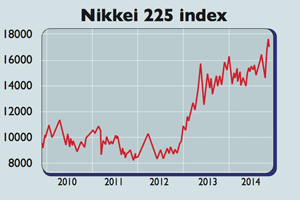
Most economists expected Japan’s economy to bounce back from its dip in the second quarter. Not for the first time, they got it wrong. GDP shrank by an annualised 1.6% between June and September. That means Japan has fallen into recession – defined as two successive quarters of falling output – for the fourth time since 2008.
The government increased the sales tax – the equivalent of VAT – in April. Consumers brought forward spending, so GDP rose strongly in the first quarter, then slumped in the second. By the third quarter, the squeeze on spending was supposed to have been shrugged off.
But the tax hike appears to have done more damage to underlying momentum than expected. This is a hefty blow to Abenomics – Prime Minister Shinzo Abe’s attempt to end almost two decades of stagnation with a mix of structural reform, a massive monetary easing programme, and fiscal stimulus.
The sales tax increase was part of these plans, being an attempt to start getting the country’s huge public debt under control. Abe has now decided to postpone a second planned increase and will stage a snap general election in December, looking for a renewed public mandate for his policies. Voters are expected to return his party to power.
That’s just as well, since “there is no plan B”, as the FT points out. The economy remains “too fragile and dependent on consumers recovering their animal spirits to take the risk” of upping the sales tax again in 2015.
Abe must push on with structural reforms to boost long-term growth potential. But the quantitative easing (QE) programme shows signs of working and there seems to have been “a tentative lifting of Japan’s deflationary mind-set”. Earnings are picking up slightly, along with consumption, so the long period of deflation could finally end.
The economic outlook is murky, but stocks should still do well. The Bank of Japan has made it clear it will print more money if that’s needed to reach inflation of 2%. That implies further yen weakness, which boosts the export-orientated market heavyweights.
One estimate suggests that every 1% fall in the yen against the dollar raises large company profits by 0.5%. Throw in still reasonable valuations and reforms to the government pension fund that will raise demand for equities, and Japanese stocks remain a good bet.